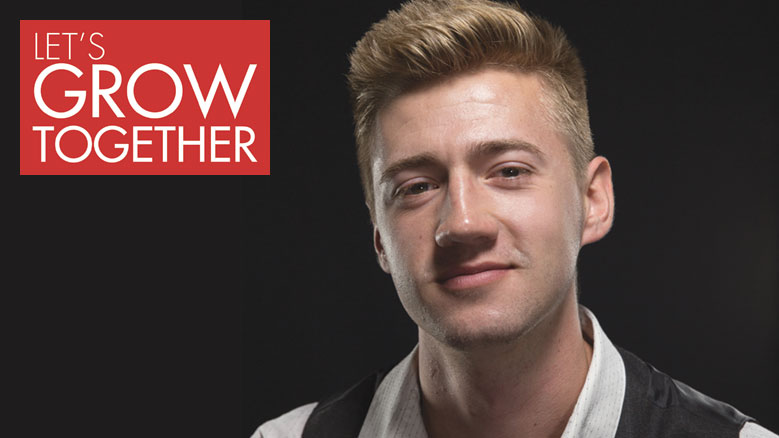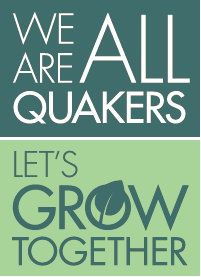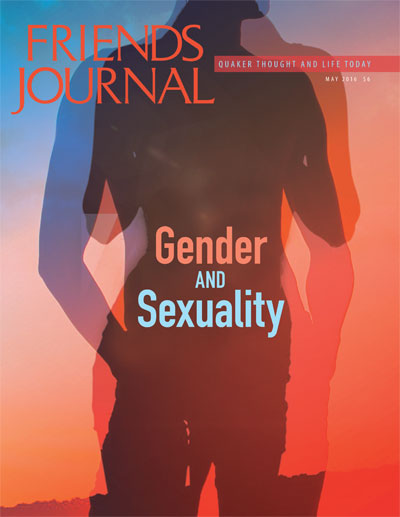
 Rob J Wilson is one of the founding members of Southern Utah Meeting in St. George, Utah. He grew up in southern Utah and is now an award-winning artist, teaching art and art history at Dixie State University. He is currently creating a new body of work which is a culmination of his talents, dedication, artistic vision, and spiritual journey. Rob turned to Friends General Conference’s New Meetings Project for help starting the meeting in St. George. The meeting had its first meeting for worship on January 1, 2015, and now has a small but growing congregation.
Rob J Wilson is one of the founding members of Southern Utah Meeting in St. George, Utah. He grew up in southern Utah and is now an award-winning artist, teaching art and art history at Dixie State University. He is currently creating a new body of work which is a culmination of his talents, dedication, artistic vision, and spiritual journey. Rob turned to Friends General Conference’s New Meetings Project for help starting the meeting in St. George. The meeting had its first meeting for worship on January 1, 2015, and now has a small but growing congregation.
How did you come to Quakerism? What were your previous experiences of faith?
My previous experiences of faith are not necessarily synonymous with my previous experiences of religion. When I think back to times in my life when I experienced faith, I can remember those individual moments of introspection, contemplation, and knowing that there was something bigger out there, knowing that God was somehow there listening to me. I have a lot of those experiences throughout my life. I was raised Mormon, and while it taught me some good things, in general it’s a very conservative religion that didn’t really offer me those faith experiences.
I wanted a deeper connection, and it was a soul-searching process to figure out how I could have a closer relationship with God. I was researching lots of different religions and exploring different forms of faith. When I was little, I remember watching that movie Friendly Persuasion and being interested in Quakers. Then much later in life, I stumbled upon the Religious Society of Friends. The name “Friends” struck me, and I read and pondered. Then I attended worship at Salt Lake Meeting [in Utah]. I traveled there whenever I would get occasion to do so. I was about 17 when I first started going to meeting; I’m 24 now. It was like I was returning home to something that I didn’t realize I was missing. I felt that all my life I had been a Quaker, but I just finally had a word for it.
I think that my previous experience of religion left me with some hangups about God in general. I had to really work, through worship and through those quiet moments in my life, to craft a new and different understanding of the nature of God. I think that on some level there are aspects of that religious tradition that did help inform my segue into Quakerism. For the most part though, I have been putting that behind me and forming a new connection with God that is untainted by dogma.
What was meeting for worship like at first? What is it like now?
When I first started attending meeting for worship it was certainly a different experience than other forms of worship that I had been used to. There was something unsettling because I was afraid to make noise. Observing other people who were comfortable in the space and silence was helpful for me. I found that the silence was so powerful in what it could communicate that it kept me coming back. In different faith traditions you can, at some level, check your brain at the door and listen to a sermon that you may or may not really connect with. The practice of being silent forced me to be an active participant in what I was trying to achieve in that moment.
Now Quaker worship for me is second nature. I carve time out of every day and every week to be still and contemplative, to see what I need to work on, and to check in with God. I really enjoy going to worship because it gives me an opportunity to share in community with other Friends.
How do you center yourself in meeting?
As Faith and Practice encourages us to do, I try as much as possible to keep my stillness throughout the morning before worship. So on Sunday mornings I don’t really speak; I’ll go through my morning routine in silence. On my way to worship, I won’t listen to music. Then when I enter worship, I usually say a silent prayer. It invites the spirit of Christ to join us and to help me to be still and listen to what messages I need to hear that day, whether they’re from a meeting member or from God speaking to me personally. Then I pray for the courage to share something if I am compelled to do so, and for the wisdom to be silent. I usually don’t say “amen” to that prayer, but I let the prayer enter the silence.
What has been your role in starting the new meeting?
I am one of the original three members of Southern Utah Friends Meeting, and that’s where my membership officially began. Ever since, every person has been on every committee. We need as much help as we can get. It’s been a very fluid process. The place that we meet is a local nonprofit. Every Sunday I come in early, open up the building if necessary, set up chairs for worship, put out the signs and food, and then stay after to close up the building. We’ve been getting together committees to do some outreach without evangelizing in any way. We want to let the community know that we are here and that we have a unique form of worship to offer. I am also on the St. George Interfaith Council, to make our presence known in the larger faith community. The interfaith council gets together about once a month to discuss various topics that are important to the community. We also plan events that bring the different faith communities together.
What keeps you coming back to Quakerism?
I think for me it is the Spirit. I feel a strong sense of Spirit when I attend worship, when I read inspirational things that other Quakers have written, or when I try to focus my life in the direction of simplicity and stewardship. I get a strong sense of spiritual confirmation that this is what I am supposed to be doing. It enriches my life and keeps me coming back every week.
Another aspect of Quakerism that sits with me really well is this idea of a sacramental living. Our lives can be a testament to the Kingdom of God on earth. I feel strangely led to build a tiny house and live in it. People say to me: “That is so crazy. Why would you do that?” But I’m going to follow it. In that sense, it’s an external social witness to a different way of living, to simplicity, to rejecting this idea of consumerism and capitalism. The fact that Quakers are so tied into living Quakerism through everyday actions is really significant. I feel like being a Quaker is about following the leadings of God wherever that may take you. That is the strongest aspect of Quakerism that informs my life. I think that we need all of the different elements of Quakerism whether they be social or spiritual.
How do see your faith and your work as an artist working together?
My work as an artist and my spiritual experience as a Quaker are fundamentally connected. My decision to become an artist over another career path was a spiritual choice made in close consultation with God over an extensive period of time. The subjects of my work and the materials I use today are equally informed by my spiritual convictions. For example, I have recently been saving non-recyclable materials to incorporate in my work as part of a sculptural series on stewardship. My artwork is fundamental to who I am as a spiritual person, and the resulting work is a part of how I am able to be a minister of the Divine. [Readers can view Rob’s artwork at robjwilson.com.]
How did you learn more about Quakerism when you first started?
Brent Bill [former coordinator of FGC’s New Meetings Project] has been an amazing resource for me in the personal conversations and contacts that I have had with him in addition to his books. I have read a lot of different books and Quaker blogs that were especially helpful in the early stages of identifying as a Quaker and deciding that this was my spiritual home. I was first introduced to Quakers when I was living in Cedar City, Utah, and the nearest meeting was three or four hours away. So Brent sent me a pamphlet: When You’re the Only Friend in Town. At that point, I tried to internalize the life lessons of being a Quaker in a more personal way. I hadn’t really truly experienced being a Quaker until I was able to more regularly attend worship. I am also a big fan of Robert Smith’s book A Quaker Book of Wisdom. It’s a fast read, and it reads more like an autobiography than anything. To this day it’s one of my favorite little Quaker books.
What would you like to see for the future of Quakerism?
My only vision, if there is one, for Quakers in the future is that we continue to follow the leading of God. Whatever our personal biases or convictions may be, I hope we are able to set those aside and follow the leading of God. God’s leading may be in the same trajectory as our biases and convictions, or it may not. My only hope for Quakers in the future is that we continue to be a spiritual people that seek God in everything that we do.



God that is untainted by dogma and concept!
That resonates.
No worship necessary.
Is there still a Quaker group in St. George, Utah? If so, I’m in!